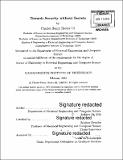Towards security without secrets
Author(s)
Herder, Charles H. (Charles Henry), III
DownloadFull printable version (20.78Mb)
Other Contributors
Massachusetts Institute of Technology. Department of Electrical Engineering and Computer Science.
Advisor
Srinivas Devadas.
Terms of use
Metadata
Show full item recordAbstract
Physical Unclonable Functions (PUFs) are a promising new cryptographic primitive that leverage manufacturing variation to create unclonable secrets in embedded systems. In this case, the secret is no longer stored permanently in digital form, but rather as the physical properties of the manufactured chip. Further, the recent proposal of "Public Model Physical Unclonable Functions" (PPUFs) does not contain any secrets at all. Instead, PPUFs propose to use a constant-factor computational speedup to distinguish an unclonable hardware device from a digital simulation. This thesis presents a new computational fuzzy extractor and stateless PUF leveraging Learning Parity with Noise (LPN). This method significantly improves over the state-of-the-art in extracting stable secrets from PUFs and has a clear security reduction to a well-accepted cryptographic assumption (LPN). In addition, this dissertation proposes for the first time a formalism describing Public Model Physical Unclonable Functions based on ordinary differential equations (ODEs), a conjecture on the form of ODE integrators, and a formal reduction of PPUF security to this conjecture. This result is extended to compare analog and digital computing more generally. Finally, this thesis provides direction for implementing a PPUF.
Description
Thesis: Ph. D., Massachusetts Institute of Technology, Department of Electrical Engineering and Computer Science, 2016. Cataloged from PDF version of thesis. Includes bibliographical references (pages 243-260).
Date issued
2016Department
Massachusetts Institute of Technology. Department of Electrical Engineering and Computer SciencePublisher
Massachusetts Institute of Technology
Keywords
Electrical Engineering and Computer Science.